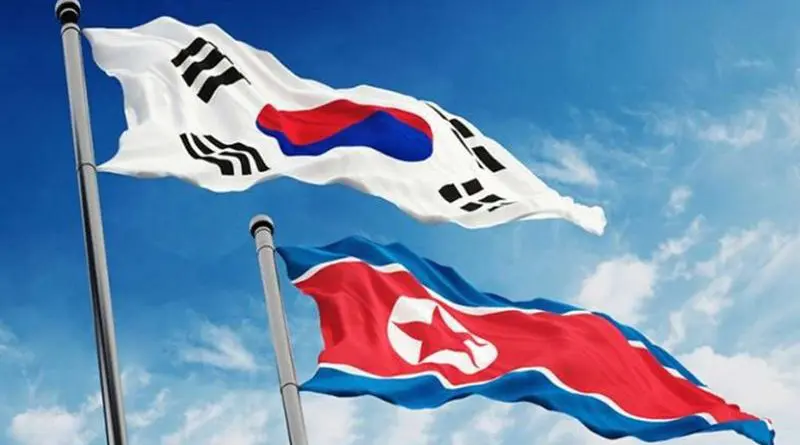Towards Stability In The Korean Peninsula: Applying The Principles Of Pancasila – OpEd
The Korean Peninsula remains a geopolitical hotspot, marked by historical tensions and conflicting strategies in dealing with North Korea. The succession of South Korean presidents with distinct approaches, such as the Sunshine Policy and a more hardline stance, has contributed to the region’s instability. This essay argues for a consistent policy approach by examining the three principles of Pancasila, the philosophical foundation of Indonesia, as a model for fostering unity and stability on the Korean Peninsula.
Adopting the principles of Pancasila—Persatuan Indonesia (Unity of Indonesia), Kerakyatan yang Dipimpin oleh Hikmat Kebijaksanaan dalam Permusyawaratan/Perwakilan (Democracy guided by inner wisdom in unanimity arising out of deliberations amongst representatives), and Keadilan Sosial bagi Seluruh Rakyat Indonesia (Social justice for the whole of the people of Indonesia)—can serve as a transformative framework for South Korea’s approach in dealing with North Korea. Such an approach, if consistently followed by successive South Korean administrations, has the potential to foster political peaceful co-existence and pave the way for long-term stability in the region.
Pancasila’s foundational principle, Persatuan Indonesia (Unity of Indonesia), holds profound implications for South Korea’s approach to its northern counterpart. Emphasizing the importance of unity, this principle offers a strategic paradigm for transcending the political vicissitudes that have characterized inter-Korean relations. South Korea, in dealing with North Korea, can forge a cohesive and unwavering stance by prioritizing the overarching goal of Korean unity.
This approach entails a commitment to sustained dialogue, even in the face of shifting administrations and political ideologies. By recognizing the commonality of a shared Korean identity, irrespective of political nuances, South Korea can build a more enduring foundation for engagement. The emphasis on unity implies a departure from short-term, transactional policies to a more visionary, long-term strategy that considers the welfare and aspirations of the Korean people as a whole. This approach not only fosters stability but also provides North Korea with a consistent and constructive partner in negotiations, creating an environment conducive to trust-building and sustained cooperation. In essence, adopting the principle of Persatuan Korea is not merely a diplomatic strategy; it is a commitment to the shared destiny and aspirations of the Korean people.
The second principle of Pancasila, Kerakyatan yang Dipimpin oleh Hikmat Kebijaksanaan dalam Permusyawaratan / Perwakilan (Democracy guided by inner wisdom in unanimity arising out of deliberations amongst representatives), presents an innovative model for South Korea’s diplomatic endeavors with North Korea. At its core, this principle champions the incorporation of diverse perspectives and collective wisdom in decision-making processes.
To implement this principle, South Korea can institute a comprehensive and inclusive policy-making approach. This involves engaging a spectrum of stakeholders, including policymakers, scholars, civil society representatives, and the general public, in deliberations regarding strategies toward North Korea. By incorporating a multitude of perspectives, South Korea can enrich its decision-making processes, ensuring a well-rounded understanding of the complex inter-Korean dynamics.
Furthermore, embracing this principle bolsters national unity by fostering a sense of shared ownership and responsibility among the South Korean populace. A transparent and participatory approach to policy formulation not only enhances the legitimacy of diplomatic initiatives but also ensures that the aspirations and concerns of the broader population are taken into account.
In essence, the principle of democratic deliberations offers a pathway toward a more robust and collectively endorsed foreign policy. By aligning diplomatic strategies with the collective wisdom derived from diverse voices, South Korea can navigate the intricacies of inter-Korean relations with a well-informed and unified approach, thus contributing to the prospects of lasting peace and stability on the Social Justice in the Korean Peninsula (Keadilan Sosial bagi Seluruh Rakyat Korea)
The third Pancasila principle, Keadilan Sosial bagi Seluruh Rakyat Indonesia (Social justice for the whole of the people of Indonesia), offers a transformative blueprint for South Korea’s approach to the Korean Peninsula. This principle, when applied to inter-Korean relations, becomes a catalyst for addressing longstanding socio-economic disparities and fostering a trajectory of mutual prosperity.
South Korea can operationalize this principle by prioritizing initiatives that bridge the socio-economic divide between the two Koreas. By directing attention and resources towards the economic development of North Korea, a more equitable distribution of opportunities and resources can be achieved. This involves the creation of collaborative projects, economic partnerships, and infrastructural investments aimed at uplifting the standard of living for all Koreans.
The commitment to social justice also implies a recognition of the broader implications of economic imbalances, extending beyond national borders. South Korea can act as a steward for the prosperity of the entire Korean Peninsula, ensuring that economic growth is inclusive and sustainable. By doing so, not only does South Korea contribute to the well-being of North Korean citizens, but it also establishes a foundation for enduring stability and cooperation.
In conclusion, the application of Pancasila’s principles offers a holistic and adaptable framework for South Korea’s approach to North Korea. By prioritizing unity, democratic deliberations, and social justice, South Korea can work towards fostering a more stable and cooperative relationship with North Korea. A consistent policy approach, rooted in these principles, can transcend political transitions and contribute to the long-term political peaceful co-existence on the Korean Peninsula.

